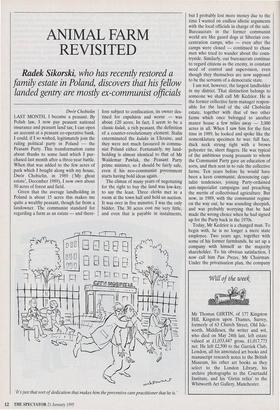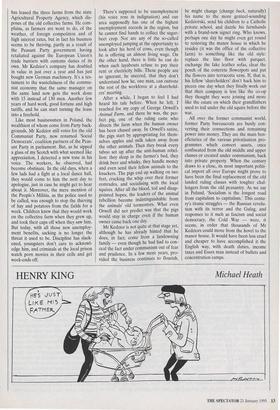ANIMAL FARM REVISITED
Radek Sikorski, who has recently restored a
family estate in Poland, discovers that his fellow landed gently are mostly ex-communist officials
Dwor Chobielin LAST MONTH, I became a peasant. By Polish law, I now pay peasant national insurance and peasant land tax; I can open an account at a peasant co-operative bank. I could, if I so wished, legitimately join the ruling political party in Poland ŌĆö the Peasant Party. This transformation came about thanks to some land which I pur- chased last month after a three-year battle. When that was added to the few acres of park which I bought along with my house, Dw6r Chobielin, in 1989 (`My ghost estate', December 1989), I now own about 50 acres of forest and field.
Given that the average landholding in Poland is about 15 acres this makes me quite a wealthy peasant, though far from a landowner. The communist standard for regarding a farm as an estate ŌĆö and there- fore subject to confiscation, its owner des- tined for expulsion and worse ŌĆö was about 120 acres. In fact, I seem to be a classic kulak, a rich peasant, the definition of a counter-revolutionary element. Stalin exterminated the kulaks in Ukraine, and they were not much favoured in commu- nist Poland either. Fortunately, my land- holding is almost identical to that of Mr Waldemar Pawlak, the Peasant Party prime minister, so I should be fairly safe, even if his neo-communist government starts having bold ideas again.
The climax of many years of negotiating for the right to buy the land was low-key, to say the least. Three clerks met in a room at the town hall and held an auction. It was over in five minutes; I was the only bidder. The 30 acres cost me very little, and even that is payable in instalments, `It's just that sort of dedication that makes him the preventive care practitioner that he is.' but I probably lost more money due to the time I wasted on endless idiotic arguments with the local officials in charge of the sale. Bureaucrats in the former communist world are like guard dogs at Siberian con- centration camps, who ŌĆö even after the camps were closed ŌĆö continued to chase men who tried to wander about the coun- tryside. Similarly, our bureaucrats continue to regard citizens as the enemy, in constant need of control and supervision, even though they themselves are now supposed to be the servants of a democratic state, I am not, however, the largest landholder in my district. That distinction belongs to someone we shall call Mr Kedzior. He is the former collective farm manager respon- sible for the land of the old Chobielin estate, together with that of two other farms which once belonged to another manor house a few miles away ŌĆö 3,000 acres in all. When I saw him for the first time in 1989, he looked and spoke like the nomenklatura specimen he was: full face, thick neck strung tight with a brown polyester tie, short fingers. He was typical of the ambitious young peasants to whom the Communist Party gave an education of sorts, and then sent in to rule the collective farms. Ten years before he would have been a keen communist, denouncing capi- talist tendencies, joining Party-ordained anti-imperialist campaigns and preaching the merits of collectivised agriculture. But now, in 1989, with the communist regime on the way out, he was sounding sheepish, and was probably worrying that he had made the wrong choice when he had signed up for the Party back in the 1970s.
Today, Mr Kedzior is a changed man. To begin with, he is no longer a mere state employee. Two years ago, together with some of his former farmhands, he set up a company with himself as the majority shareholder. To his obvious satisfaction, I now call him Pan Prezes, Mr Chairman. Under the privatisation plan, the company has leased the three farms from the state Agricultural Property Agency, which dis- poses of the old collective farms. He com- plains, as farmers are wont to do, of the weather, of foreign competition and of high interest rates, but in fact his business seems to be thriving, partly as a result of the Peasant Party government having retaliated against the European Union's trade barriers with customs duties of its own. Mr Kedzior's company has doubled in value in just over a year and has just bought new German machinery. It's a tes- tament to the wastefulness of the commu- nist economy that the same manager on the same land now gets the work done with 15 instead of 130 men. Another few years of hard work, good fortune and high tariffs, and he can start turning the lease into a freehold.
Like most businessmen in Poland, the wealthiest of whom come from Party back- grounds, Mr Kedzior still votes for the old Communist Party, now renamed 'Social Democrats', coalition partners of the Peas- ant Party in parliament. But, as he sipped a glass of my Scotch with what seemed like appreciation, I detected a new tone in his voice. The workers, he observed, had become obstinate. In the old days, when a few lads had a fight at a local dance hall, they would come to him the next day to apologise, just in case he might get to hear about it. Moreover, the mere mention of the People's Militia, as the police used to be called, was enough to stop the thieving of hay and potatoes from the fields for a week. Children knew that they would work on the collective farm when they grew up, and took their caps off when they saw him. But today, with all those new unemploy- ment benefits, sacking is no longer the threat it used to be. Discipline has slack- ened, youngsters don't care to acknowl- edge him, and criminals at the local prison watch porn movies in their cells and get week-ends off. There's supposed to be unemployment (his voice rose in indignation) and our area supposedly has one of the highest unemployment records in the region, but he cannot find hands to collect the sugar- beet crop. Nor are any of the so-called unemployed jumping at the opportunity to look after his herd of cows, even though he is offering an almost living wage. On the other hand, there is little he can do when such layabouts refuse to pay their rent or electricity bills. These people are so ignorant, he sneered, that they don't understand how he, one man, can outvote the rest of the workforce at a sharehold- ers' meeting.
After a while, I began to feel I had heard his tale before. When he left, I reached for my copy of George Orwell's Animal Farm, and there he was, the per- fect pig, one of the ruling caste who directs the farm when the human owner has been chased away. In Orwell's satire, the pigs start by appropriating for them- selves apples and milk taken away from the other animals. Then they break every taboo set up after the anti-human rebel- lion: they sleep in the farmer's bed, they drink beer and whisky, they handle money and even send their fellow animals to the knackers. The pigs end up walking on two feet, cracking the whip over their former comrades, and socialising with the local squires. After all the blood, toil and disap- pointed hopes, the leaders of the animal rebellion become indistinguishable from the animals' old tormentors. What even Orwell did not predict was that the pigs would stay in charge even if the human owner came back one day.
Mr Kedzior is not quite at that stage yet, although he has already hinted that he does, in fact, come from a landowning family ŌĆö even though he had had to con- ceal the fact under communism out of fear and prudence. In a few more years, pro- vided the business continues to flourish,
he might change (change back, naturally) his name to the more genteel-sounding Kedziorski, send his children to a Catholic private school, and dazzle his farmhands with a brand-new signet ring. Who knows, perhaps one day he might even get round to restoring the manor house in which he resides (it was the office of the collective farm) to something like the old style: replace the lino floor with parquet, exchange the fake leather sofas, clear the porch of the concrete flowerpots and put the flowers into terracotta urns. If, that is, his fellow 'shareholders' don't hack him to pieces one day when they finally work out that their company is less like the co-op they thought they were joining and more like the estate on which their grandfathers used to toil under the old squire before the war.
All over the former communist world, former Party bureaucrats are busily con- verting their connections and remaining power into money. They are the main ben- eficiaries of the various privatisation pro- grammes which convert assets, once confiscated from the old middle and upper classes or created under communism, back into private property. When the century draws to a close, its most important politi- cal import all over Europe might prove to have been the final replacement of the old ŌĆó landed ruling classes with tougher chal- lengers from the old peasantry. As we say in Poland, 'Socialism is the longest road from capitalism to capitalism.' This centu- ry's titanic struggles --- the Russian revolu- tion with its terror and the Gulag, and responses to it such as fascism and social democracy, the Cold War ŌĆö were, it seems, in order that thousands of Mr Kedziors could move from the hovel to the manor house. It would have been less cruel and cheaper to have accomplished it the English way, with death duties, income taxes and Essex man instead of bullets and concentration camps.



























































 Previous page
Previous page